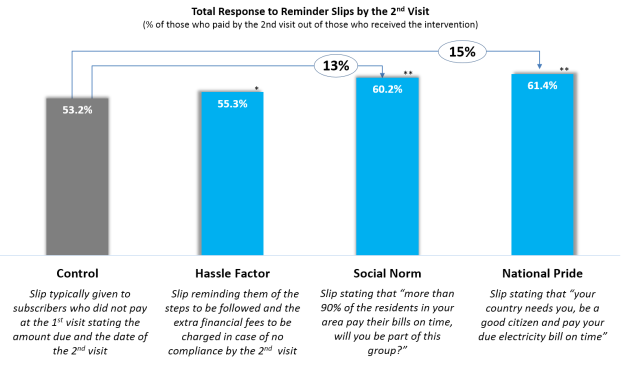Improving Timely Payment of Electricity Bills
- Posted by a.habib@ids.com.lb
- Date January 24, 2019
- Comments 0 comment

Problem
Generally in Lebanon, subscribers receive and pay utility bills to collectors. Under the regulation of Electricity Du Liban (i.e. the governmental establishment controlling most of the country’s electricity production, transmission, and distribution), bills are to be collected within 40 days of their issuance date; Additionally, collectors are required to visit their assigned subscribers for a maximum of two times, giving reminder slips to those who do not pay by the first visit, in which the amount due and the proposed date of the second visit is stated. In practice, more than 90% of subscribers pay within 40 days, but collectors make more than two visits to achieve that rate, adding considerable administrative and human costs to the collection process.
Against this background, Nudge Lebanon studied the impact of simple messages on reminder slips on encouraging subscribers to pay their bills by the collectors’ second visit.
Intervention
A randomized control trial was conducted in Saida City, in collaboration with Electricité du Liban (EDL) and the assigned Service Provider, to examine the effect of adding simple nudge messages in the reminder slips on increasing payment of electricity bills by the second visit of collectors.
The trial was randomized at subscriber level, whereby a sample of 429 participating households randomly received one of four slips from collectors:
- The control slip, which consists of the original reminder with no modification.
- The hassle factor and loss aversion slip, which lays out steps the subscriber has to follow in case of no compliance by the second visit and highlights the extra financial fees that will be charged
- The social norm slip, which reveals the high percentage of subscribers in the local community paying their bills on time. The message reads as follows: “More than 90% of the residents in your area pay their bills on time, will you be part of this group?”
- The national pride slip, which primes individuals to instill a sense of national responsibility, by including the Lebanese flag and using soft language that triggers a sense of patriotism. The message reads as follows: “Your country needs you, be a good citizen and pay your due electricity bill on time”
Nudge Lebanon recorded, through collectors, whether households paid their dues on the first visit, either immediately or after receiving the reminder slips, or paid in the second visit.
Result and Impact
Results show that the National Pride nudge was the most effective, in details:
- 61.4% of those receiving the “National Pride” slip paid their bills by the second visit (significant at 5% level), which is 15% higher than payment rate of the control group;
- 60.2% of subscribers receiving the “Social Norms” slip paid their bills by the second visit (significant at 5% level), which constitutes a 13% improvement compared to the control group, and finally
- 55.3% of subscribers receiving the “Hassle Factor” slip paid their bills by the second visit (statistically insignificant), which constitutes an increase of 4% compared to control response rate

(* Statistically insignificant, ** Statistically significant with p < 0.05)
To support the results of the overall effectiveness of modified slips, the team examined the effect of receiving any intervention in comparison to getting the unmodified slip. Affirming the initial results, the analysis further conveys that introducing a behaviourally-designed intervention has a positive effect on bill payment whereby people are 11% more likely to pay.
The success of the nudge shows that cost-effective and small changes in context, in particular, through ‘Social Norms’ and ‘National Pride’ nudges can effectively speed up bill payment rates. Even single-digit percentage improvement in bill payment speed can create significant savings if such an experiment is replicated at the national level. Secondly, it shows that a behaviourally-driven slip increases the probability of people paying their bills as opposed to normal slip. While further experimentation is needed, a joint-nudge using the two most successful interventions, namely national pride and social norms, is likely to yield an even faster payment rate. Last, this case is an eye opener for a multitude of interventions in other sectors, including tax payment, with great potential for massive savings and improved public service delivery at the national level.
You may also like

Increasing Medical Attention to High Blood Pressure


